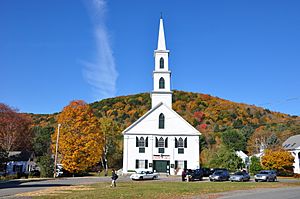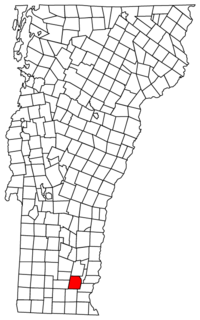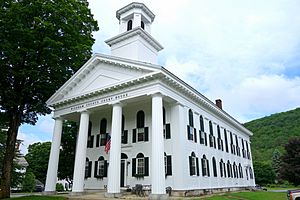Newfane, Vermont facts for kids
Quick facts for kids
Newfane, Vermont
|
|
|---|---|

A church in Newfane
|
|

Location in Vermont
|
|
| Country | United States |
| State | Vermont |
| County | Windham |
| Chartered | 1761 |
| Communities |
|
| Area | |
| • Total | 40.4 sq mi (104.6 km2) |
| • Land | 40.2 sq mi (104.2 km2) |
| • Water | 0.1 sq mi (0.4 km2) |
| Elevation | 1,004 ft (306 m) |
| Population
(2020)
|
|
| • Total | 1,645 |
| • Density | 15.8/sq mi (6.1/km2) |
| Time zone | UTC-5 (Eastern (EST)) |
| • Summer (DST) | UTC-4 (EDT) |
| ZIP Codes | |
| Area code(s) | 802 |
| FIPS code | 50-48400 |
| GNIS feature ID | 1462159 |
Newfane is a charming town in Windham County, Vermont, United States. It's known as the shire town, which means it's where the main government offices for the county are located, like a county seat. In 2020, about 1,645 people lived here. Newfane includes three smaller communities: the village of Newfane, Williamsville, and South Newfane.
Contents
The Story of Newfane
Newfane was first planned as part of the New Hampshire grants. Governor Benning Wentworth officially created the town on June 19, 1753. He named it Fane, after a person called John Fane.
Early Challenges and a New Beginning
However, a war called the French and Indian War made it unsafe to settle the town. Because no one held a town meeting within five years, the first plan for the town was canceled. So, Governor Wentworth issued a brand new plan on November 3, 1761, and called it New Fane.
Families from Worcester County, Massachusetts finally settled Newfane in 1766. Newfane became the main town for the county before 1812.
Moving the Town Center
The first village was built on top of Newfane Hill. This included the county buildings. But traveling there in winter was very difficult. So, in 1825, the village was moved to the flat land below. This new location was called Fayetteville until 1882, named after the Marquis de Lafayette.
Growth and Prosperity
Newfane has a varied landscape with high hills and deep valleys. Farmers found good soil in the flat areas for growing crops. The higher lands were good for grazing livestock like cows.
Many streams provided water power for mills. By 1859, Newfane had several industries. These included factories making leather and linseed oil. There were also two flour mills, two lumber mills, and a large factory making carriages.
Because of these successful businesses, Newfane became very rich in the 1800s. During this time, many beautiful buildings were constructed. These buildings were built in styles like Federal, Greek Revival, and Victorian architecture. Today, these historic buildings help make Newfane a popular place for tourists to visit.
Newfane's Geography
Newfane covers about 40.4 square miles (104.6 square kilometers). Most of this area, about 40.2 square miles (104.2 square kilometers), is land. A small part, 0.1 square miles (0.4 square kilometers), is water.
Rivers and Roads
Two rivers flow through the town: the West River and the Rock River. Vermont Route 30 is a main road that crosses through Newfane.
A Golden Discovery
The largest gold nugget ever found in New England was discovered in the West River in Newfane. It weighed 6.5 ounces!
Newfane's Population
| Historical population | |||
|---|---|---|---|
| Census | Pop. | %± | |
| 1790 | 660 | — | |
| 1800 | 1,000 | 51.5% | |
| 1810 | 1,276 | 27.6% | |
| 1820 | 1,506 | 18.0% | |
| 1830 | 1,441 | −4.3% | |
| 1840 | 1,043 | −27.6% | |
| 1850 | 1,304 | 25.0% | |
| 1860 | 1,192 | −8.6% | |
| 1870 | 1,113 | −6.6% | |
| 1880 | 1,031 | −7.4% | |
| 1890 | 952 | −7.7% | |
| 1900 | 905 | −4.9% | |
| 1910 | 820 | −9.4% | |
| 1920 | 710 | −13.4% | |
| 1930 | 662 | −6.8% | |
| 1940 | 672 | 1.5% | |
| 1950 | 708 | 5.4% | |
| 1960 | 714 | 0.8% | |
| 1970 | 900 | 26.1% | |
| 1980 | 1,129 | 25.4% | |
| 1990 | 1,555 | 37.7% | |
| 2000 | 1,680 | 8.0% | |
| 2010 | 1,726 | 2.7% | |
| 2020 | 1,645 | −4.7% | |
| U.S. Decennial Census | |||
In 2000, there were 1,680 people living in Newfane. The town had 693 households, with 464 of them being families. On average, there were about 41.7 people per square mile.
Who Lives in Newfane?
Most of the people in Newfane were White (98.10%). A small number were from other racial backgrounds. About 0.95% of the population identified as Hispanic or Latino.
About 31.3% of households had children under 18 living with them. Most households (57.1%) were married couples. About 24.1% of households were individuals living alone.
Age and Income
The population's age was spread out. About 23.9% were under 18 years old. The median age was 42 years.
In 2000, the average income for a household in Newfane was $45,735. For families, the average income was $51,328. A small percentage of families (4.7%) and individuals (5.1%) lived below the poverty line.
Places to Visit
- Williamsville Covered Bridge: A beautiful old bridge built in 1870.
Famous People from Newfane
Many interesting people have connections to Newfane, including:
- Harrison G. O. Blake: A US congressman.
- Paul A. Chase: A judge on the Vermont Supreme Court.
- Ralph B. DeWitt: A Brigadier General in the Marine Corps.
- Asa Belknap Foster: A successful businessman and politician.
- Frank L. Fish: Another judge on the Vermont Supreme Court.
- Robert Fritz: An author, composer, and filmmaker.
- John Kenneth Galbraith: A well-known economist.
- Arthur Otis Howe: A Vermont state representative and senator.
- Marshall Otis Howe: A Vermont state legislator.
- Luke Knowlton: One of the founders of Newfane, also a judge and politician.
- Paul Holland Knowlton: A businessman and politician.
- John H. Merrifield: A politician.
- Archer Mayor: An author famous for mystery novels.
- Henriette Mantel: An Emmy Award-winning writer, actress, producer, director, and comedian.
- Lee Stephen Tillotson: The Adjutant General of the Vermont National Guard.
Newfane's Climate
Newfane experiences a humid continental climate. This means it has big differences in temperature throughout the year. Summers are usually warm to hot, and often humid. Winters are cold, and sometimes very cold. This type of climate is labeled "Dfb" on climate maps.
See also
 In Spanish: Newfane (Vermont) para niños
In Spanish: Newfane (Vermont) para niños
 | Claudette Colvin |
 | Myrlie Evers-Williams |
 | Alberta Odell Jones |







